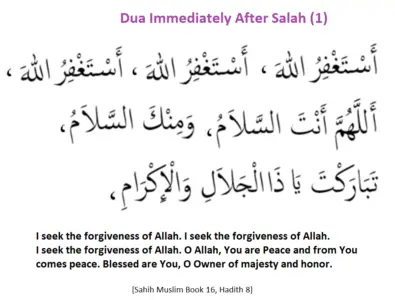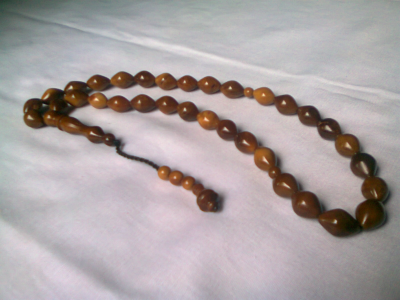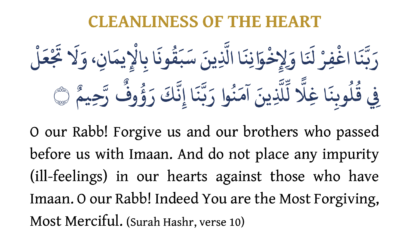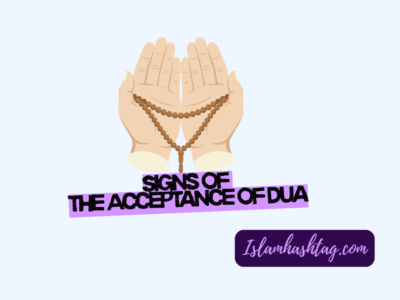Dua after Salah offers an opportunity to deepen one’s connection, seek blessings, and express heartfelt desires. It is the time when dua is accepted.
See : List of dhikr
Dua after salah is accepted
Abu Umamah (May Allah be pleased with him) reported:The Messenger of Allah (ﷺ) was asked: “At what time does the supplication find the greatest response?” He (ﷺ) replied, “A supplication made during the middle of the last part of the night and after the conclusion of the obligatory prayers.””جوف الليل الآخر ودبر الصلوات المكتوبات (1)
(1) reference- Riyadh as saliheen 1500
How should one do Dua after Salah
Fadalah bin ‘Ubaid (May Allah be pleased with him) reported: The Messenger of Allah (ﷺ) heard some one supplicating after his prayer without praising Allah and without supplicating Allah for the Prophet (ﷺ). With regard to him, the Messenger of Allah (ﷺ) said, “This man rushed.” Then he called him and said, “When any one of you have performed Salat (prayer) and wants to supplicate, let him praise Allah first then glorify Him in the beginning and then he should supplicate Allah for me. Then he may supplicate for whatever he likes.”
(2) Reference: Riyad as-Salihin 1404
Dua to read after Salah
Dua to read after Salah in Arabic:
اللّهمَّ اَ نْتَ السّلاَ مُ و مِنْكَ السّلامُ ﴿﴾ تَبارَكْتَ ياَذَلْجَلالِ وَلاِكْراَمِ
Dua to read after Salah in English
“Allahumma, anta’s-salam wa minkas’salam, Tabarakta-ya-dhal’Jalali wa’l-Ikram.”
Meaning:
This means: O’ Allah, You are the Peace, and You are the Source of Peace, You are Blessed, Oh Possessor of Glory and Honor”
Another duas we learn from Hadiths are-
Abu al-Zubair said: Abd Allah b. al-Zubair used to recite this supplication after each (prescribed) prayer. He then narrated a similar supplication and added to it: “There is no might and no power except in Allah; there is no god but Allah Whom alone we worship. To Him belongs wealth.”
وَلاَ حَوْلَ وَلاَ قُوَّةَ إِلاَّ بِاللَّهِ لاَ إِلَهَ إِلاَّ اللَّهُ لاَ نَعْبُدُ إِلاَّ إِيَّاهُ لَهُ النِّعْمَةُ ”
(3) Reference: Sunan Abi Dawud 1507
Another beautiful dua,
“اللهم اغفر لي ما قدمت وما أخرت، وما أسررت وما أعلنت، وما أسرفت، وما أنت أعلم به مني، أنت المقدم، وأنت المؤخر، لا إله إلا أنت”
‘Ali (May Allah be pleased with him) reported:When the Messenger of Allah (ﷺ) was in Salat (prayer), he used to supplicate towards the end of prayer after Tashahhud and before the concluding salutations: “Allahum-maghfir li ma qaddamtu wa ma akh-khartu, wa ma asrartu, wa ma a’lantu, wa ma asraftu, wa ma Anta a’lamu bihi minni. Antal-Muqqadimu, wa Antal-Mu’akh-khiru. La ilaha illa Anta
(O Allah! Forgive my former and latter sins, which I have done secretly and those which I have done openly, and that I have wronged others, and those defaults of mine about which You have better knowledge than I have. You Alone can send whomever You will to Jannah, and You Alone can send whomever You will to Hell-fire. None has the right to be worshipped but You.”
(4) Reference -Riyad as-Salihin 1424
Tasbih after Salah
اللّهمَّ اَ نْتَ السّلاَ مُ و مِنْكَ السّلامُ ﴿﴾ تَبارَكْتَ ياَذَلْجَلالِ وَلاِكْراَمِ
“Allahumma, anta’s-salam wa minkas’salam, Tabarakta-ya-dhal’Jalali wa’l-Ikram.”
This means: O’ Allah, You are the Peace, and You are the Source of Peace, You are Blessed, Oh Possessor of Glory and Honor”
سُبْحاَنَ اللّهِ وَ الْحَمْدُ لِلهِ و لاآاِلَاهَ الا اللهُ وَللهُ اَكْبَرْ وَلا حَوْلَ ولا قُوَّةَ اِلاَّباِللهِ الْعَلِيِّ الْعَظِيمُ
At the end, additionally, one says in Arabic “Subhanallahi, wal-hamdu-lillahi wa la-ilahaill’Allahu-wa’l-lahu-akbar, Wa la hawla wa la quwwata illa billah-il-aliy’yil-adhim.” This means:
“Glory be to Allah, and praise be to Allah, and there is no god but Allah, and Allah is the Most High. It is only by the assistance, help and power of Allah the Most Great that we give up rebelling and turn to obeying Allah the Lord.
Tasbeehs: سُبْحاَنَ اللهِ Subhanallah: 33 times (This means: Glory be to Allah)
Tasbeehs: اَلْحَمْدُ لِلهِ Alhamdulillah: 33 times (This means: Praise be to Allah)
Tasbeehs: اَلّلَهُ اَكْبَرْ Allahu Akbar: 33 times (This means: Allah is the Greatest)
لاَأِلَاهَ اِلاَّ اللّهُ وَحْدَهُ لاَ شَرِيكَ لَهُ لَهُ الْمُلْكُ وَلَهُ الْحَمْدُ وَهُوَ عَلىَ كُلِّ شَيْءِِقَدِيرُ
“La-ilaha-ill’Allahu wahdahu-la-sharikalah, Lahul-mulku wa lahul-hamdu wa huwa ala-kulli-shay’in-Qadir, Subhana rabbiye’laliyyi’l-a’le’l-vehhâb.”
“There is no god but Allah alone, He has no partners, to Him belongs dominion and to Him belongs praises, and He has power over all things”
اَللّٰهُمَّ أَعِنّ۪ي عَلٰى ذِكْرِكَ وَشُكْرِكَ وَحُسْنِ عِبَادَتِكَ
“O Allah! Help me to remember You and recite Your name, to thank for Your bounties, and to worship You as befits You!” (Abu Dawud, Witr 26)
Consistent practice of making Dua after Salah instills a sense of reliance on Allah and strengthens one’s faith. It serves as a reminder that ultimate control lies with Allah alone, fostering resilience and tranquility in the face of life’s uncertainties. Believers find solace in the act of entrusting their affairs to Allah, knowing that He is the best of planners.
Follow us in Facebook for daily updates
Discover more from Islam Hashtag
Subscribe to get the latest posts sent to your email.







